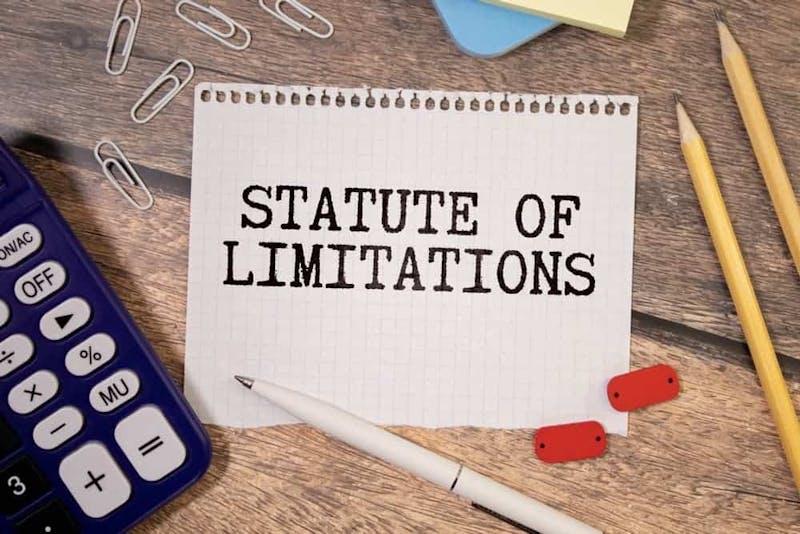
If you have suffered injuries or property damage from a car accident caused by another driver’s or party’s fault, you could have the right to pursue a legal claim against liable parties to recover compensation for your injuries and losses.
When pursuing a car accident claim, you might need to file a lawsuit to obtain payment from a court judgment against the liable party. However, the statute of limitations imposes a deadline for filing personal injury lawsuits, including car accident lawsuits, so you and your lawyer must file before the applicable deadline.
Although the deadline could vary depending on the circumstances of your case, waiting until after the statute of limitations expires for your claim could result in the loss of your right to hold at-fault parties accountable for your losses. The court can and will dismiss any case filed after the expiration date. This is why working with a knowledgeable car accident lawyer as soon as possible is so important.
About Car Accident Claims
A car accident claim allows you to seek compensation for injuries and losses you suffer in a crash caused by another driver’s or party’s wrongdoing. Important things to know about car accident claims include:
Types of Car Accidents
Common types of car accidents include:
- Front-end collisions. A type of accident where the front of one vehicle collides with the front of another vehicle, often when one vehicle strays over the center line or median or travels the wrong way down a one-way street
- Rear-end collisions. Rear-end collisions involve the front of one car crashing into the back of another, often at intersections or in heavy traffic.
- Sideswipe collisions. A type of collision where the side of one car strikes the side of another, often because one car drifts out of its lane or a driver attempts to merge into a lane occupied by another vehicle
- Side-impact/T-bone collisions. Accidents in which the front of one vehicle crashes into the side of another, often at intersections when drivers run red lights or stop signs or fail to yield the right of way
- Rollover accidents. Accidents that involve vehicles flipping onto one side or their roofs or tumbling over multiple times before coming to rest
- Single-vehicle accidents. A car accident that involves one car striking an object other than another vehicle, such as a traffic sign, fence, or tree
- Multi-vehicle accidents. Also called pile-up accidents, these accidents involve three or more cars that all collide at once
Common Causes of Car Accidents
Some of the most frequent causes of car accidents include:
- Speeding
- Traveling too fast for road/traffic/weather conditions
- Tailgating/following too closely
- Reckless driving, including excessive speeding, street racing, or swerving around or through traffic
- Disregarding traffic controls, including running red lights or stop signs
- Failing to yield the right of way
- Making unsafe or illegal turns or lane changes
- Failing to use turn signals or mirrors
- Distracted driving, including driving while using a cell phone, eating, drinking, grooming, or reaching for something inside the vehicle
- Drowsy/fatigued driving
- Driving under the influence of alcohol or drugs
- Driver inexperience
- Inadequate vehicle maintenance
- Car part defects
- Adverse weather conditions
- Low lighting or poor visibility
- Poor road conditions, including potholes or debris on the road
Potentially Liable Parties in a Car Accident Claim
Parties your car accident can hold liable in your claim include:
- Another driver who hits you due to negligence
- An at-fault driver’s employer, if the accident occurred while the driver was working
- A vehicle’s owner, who could be liable for negligently entrusting the car to a careless or reckless driver or for failing to maintain the vehicle properly
- A mechanic or auto shop, which could be liable for negligent maintenance or repairs that contribute to an accident
- A car manufacturer or third-party auto part manufacturer, which could be liable for defects that cause mechanical failures and lead to a car accident
What Compensation Can You Recover in a Car Accident Claim?
The financial recovery you receive from a car accident lawsuit could provide you with compensation for your ongoing and future losses, including:
- Repairing your car or reimbursing you for the value of your vehicle if the insurance company declares it a total loss following the accident
- Costs of medical treatment and rehabilitation for your injuries, including emergency care, hospitalization, surgeries, pain medication, doctor’s visits, and physical therapy
- Costs of long-term care you might need for permanent disabilities, such as home healthcare services, assistive devices, or disability accommodations in your home
- Lost income from missed work or reduced earnings while on part-time or light-duty work
- Loss of future earning capacity or job benefits if you suffer permanent disabilities
- Subjective costs like pain, suffering, emotional distress, and lost quality of life due to disabilities or disfigurements that interfere with your daily life
Statutes of Limitations
Statute of limitations laws impose deadlines for filing legal actions like car accident lawsuits. Every legal claim made under state or federal law has a statute of limitations. Once the statute of limitations expires on a claim, the claimant loses the right to seek relief in court.
Why Have a Statute of Limitations?
The statute of limitations:
- Preserves physical evidence. Physical evidence from a car accident can deteriorate over time. For example, drivers often repair car damage in the days and weeks following an accident. Surveillance and traffic camera footage usually gets deleted or recorded over in the ordinary course of business. Police accident reports and medical records often become harder to access as time passes. Requiring the timely filing of car accident lawsuits helps to preserve critical evidence for each case.
- Ensures fresh witness memories. The memories of eyewitnesses to a car accident inevitably fade with time. Forcing claimants to file car accident lawsuits promptly ensures that eyewitnesses share their testimony while their memories of the car accident are relatively fresh.
- Offers finality to potentially liable parties. Drivers or other parties that are liable for a car accident should not have to worry indefinitely about the potential for a lawsuit. Once the statute of limitations expires, at-fault parties can proceed with financial and life decisions without having to keep looking over their shoulders for imminent lawsuits.
When Does the Statute of Limitations Run Out?
Typically, the statute of limitations on a car accident claim begins to run out on the day of the accident since you immediately know that you have a cause of action against the at-fault party.
However, in certain circumstances, the statute of limitations could pause or “toll.” The court will exclude any period of tolling from the calculation of the limitations period on your claim, which effectively gives you more time to file your lawsuit.
Circumstances that could toll the statute of limitations for a car accident claim include:
- Accidents involving minors. When a person under 18 suffers injuries in a car accident, the statute of limitations does not begin to run out on their claim until they reach adulthood and gain the legal capacity to file a lawsuit in their own name.
- Physical or mental disabilities. The court could toll the statute of limitations for any period in which a car accident victim suffers a physical or mental disability that prevents them from pursuing legal action. For example, the statute of limitations could pause for a car accident victim who falls into a coma due to the accident.
- Military service. The Servicemembers’ Civil Relief Act (SCRA) excludes any period of a military servicemember’s active duty service from the computation of the statute of limitations. The Act protects the rights of servicemembers who deploy to different states or overseas, which makes it difficult to prosecute a car accident lawsuit at home.
- Equitable tolling. Courts could agree to toll the statute of limitations for equitable reasons or where the interests of justice support tolling the limitations period. For example, if you had a hit-and-run car accident, the court could toll the time it took you to identify and locate the driver who fled from the scene.
The Statute of Limitations for Car Accident Claims
Every state has laws establishing the statute of limitations and other claim deadlines for car accident cases. In most states, you have anywhere from one to six years to file a lawsuit after sustaining injuries in a car accident.
However, depending on the facts and circumstances of your case, the court could toll the limitations period for your claim, giving you additional time to file a lawsuit. You should consult with a car accident lawyer as soon as possible after a crash to determine how long you have to file your car accident lawsuit.
Other Applicable Deadlines in Car Accident Claims
Suppose you have a car accident claim involving a collision with a government employee or government-owned vehicle. In that case, you might have even less time to file a claim against the liable government entity.
Many states impose tight deadlines on government claims, with some time limits lasting just a few months or even a matter of weeks. The best way to avoid losing money to preventable errors like missed filing deadlines is to work with a seasoned personal injury lawyer as soon as possible after an accident.
What Happens if You File a Lawsuit After the Statute of Limitations Expires?
If you fail to file your lawsuit before the statute of limitations expires on your car accident claim, you could lose your right to recover compensation from the at-fault party or their insurance company.
After the legal deadline, the driver or other defendants in your case can file a motion with the court to dismiss your lawsuit as time-barred. The trial court will grant the motion if it finds that you filed suit after the expiration of the statute of limitations, permanently dismissing your case even if the evidence shows that you have a solid underlying claim.
How Can a Car Accident Lawyer Help You Comply With the Statute of Limitations?
A car accident lawyer can help you identify critical legal deadlines and file your car accident claim in a timely manner. Your lawyer can review the details of your case to determine the deadline for a car accident lawsuit in your case and whether any circumstances might toll the statute of limitations for your claim.
An attorney can also efficiently handle all aspects of preparing and pursuing your claim, including:
- Thoroughly investigating the accident to secure the evidence necessary to prove your case, such as police accident reports, accident scene photos/videos, surveillance/traffic camera footage, and eyewitness statements
- Reviewing the facts of your case to identify the party or parties who could be liable for your injuries and losses
- Identifying applicable insurance policies
- Working with expert witnesses as needed to build a persuasive case
- Documenting your injuries and losses to calculate how much compensation you could recover
- Preparing and filing insurance claims or demand letters on your behalf
- Negotiating with insurance adjusters and at-fault parties to settle your car accident case if possible
- Filing a car accident lawsuit on your behalf before the statute of limitations expires on your claim if litigation is necessary to pursue a fair financial recovery
Staying Aware of the Statute of Limitations Will Help You Preserve Your Rights to Pursue Compensation in a Car Accident Claim

Preparing and pursuing a car accident claim takes time. Your lawyer might need to spend several weeks or months investigating the accident to recover evidence proving another party’s fault for the crash. After that, they might spend weeks or months negotiating a settlement with the at-fault party or insurance company.
Remember to keep the statute of limitations in mind throughout this process. If you have grounds for a car accident lawsuit, you need to file within the limitations period to avoid losing your legal right to demand a fair recovery. Working with a personal injury lawyer is the best way to keep your case on track and pursue the compensation you deserve before it’s too late.












